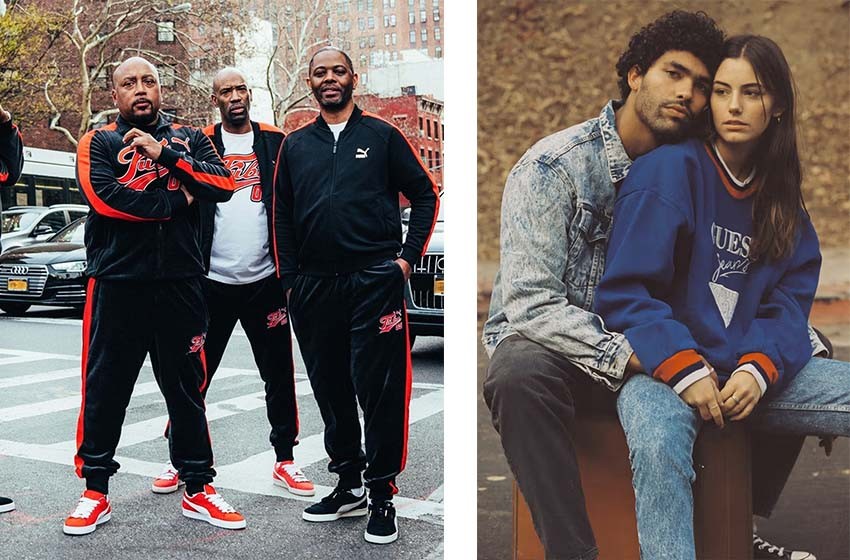The 1990s was a transformative era for branding and marketing, as companies leveraged emerging technologies and cultural shifts to create lasting impressions. This decade gave birth to some of the most iconic brands that shaped consumer culture worldwide. From fashion to technology, these brands left an indelible mark on society, influencing generations to come. In this article, we will explore the most memorable 90s brands and their enduring legacy.
As we delve into the world of 90s brands, it's important to understand the socio-economic context that allowed these companies to thrive. The 90s were marked by globalization, the rise of the internet, and a booming economy, all of which contributed to the success of brands during this period. These factors created a perfect storm for innovation and creativity, resulting in brands that resonated deeply with consumers.
This article aims to provide a comprehensive overview of the most iconic 90s brands, their impact on culture, and how they continue to influence the modern marketplace. Whether you're a nostalgia enthusiast or a marketing professional, this exploration of 90s brands will offer valuable insights into the power of branding and its lasting effects.
Read also:Ice Purse A Revolutionary Fashion Accessory For Modern Women
Table of Contents:
- Introduction to 90s Brands
- Fashion Brands of the 90s
- Technology Brands of the 90s
- Beverage Brands of the 90s
- Entertainment Brands of the 90s
- Toys and Games Brands of the 90s
- Why 90s Brands Still Matter
- Marketing Strategies of the 90s
- Impact on Modern Brands
- Conclusion and Looking Ahead
Introduction to 90s Brands
The 1990s was a decade of rapid transformation, particularly in the realm of consumer culture. Brands during this time were not just about selling products; they were about creating experiences and building communities. The rise of the internet and cable television allowed brands to reach wider audiences, making the 90s a golden era for marketing innovation.
One of the defining characteristics of 90s brands was their ability to tap into the cultural zeitgeist. Whether it was through catchy slogans, memorable advertising campaigns, or innovative product design, these brands managed to capture the imagination of consumers across the globe. Many of these brands remain household names today, a testament to their lasting impact on society.
As we explore the world of 90s brands, it's essential to recognize the socio-economic factors that contributed to their success. The economic boom of the 90s, coupled with the rise of globalization, created a fertile ground for brands to thrive. This article will delve into the most iconic brands of the decade, examining their contributions to culture and commerce.
Fashion Brands of the 90s
Key Players in the Fashion Industry
The 90s fashion scene was dominated by brands that defined the era's style. Names like Tommy Hilfiger, Calvin Klein, and GAP became synonymous with fashion during this period. These brands not only set trends but also influenced how people perceived fashion as a form of self-expression.
- Tommy Hilfiger: Known for its preppy style, Tommy Hilfiger became a favorite among celebrities and fashion enthusiasts alike.
- Calvin Klein: With its minimalist designs and provocative advertising, Calvin Klein revolutionized the fashion industry.
- GAP: The casual yet chic style of GAP made it a go-to brand for everyday wear.
These brands capitalized on the growing trend of casual wear, making it acceptable to dress comfortably without sacrificing style. Their influence can still be seen in today's fashion industry, where comfort and style coexist harmoniously.
Read also:Diamond And Wedding Ring A Guide To Choosing The Perfect Symbol Of Love
Technology Brands of the 90s
The Rise of Tech Giants
The 90s was a pivotal decade for technology brands, with companies like Apple, Microsoft, and Intel leading the charge. The advent of personal computers and the internet transformed the way people lived and worked, and these brands played a crucial role in shaping the digital landscape.
Apple's introduction of the iMac in 1998 marked a turning point in the company's history, signaling a return to innovation and design excellence. Microsoft, with its Windows operating system, became the dominant force in the software industry, while Intel's processors powered the majority of PCs worldwide.
The impact of these technology brands on modern society cannot be overstated. They laid the foundation for the digital revolution, paving the way for the tech-driven world we live in today.
Beverage Brands of the 90s
Refreshing Trends in the Beverage Industry
Beverage brands in the 90s were all about offering consumers refreshing and innovative products. Coca-Cola and PepsiCo continued to dominate the soft drink market, while energy drinks like Red Bull made their debut, catering to a new generation of consumers.
One of the notable trends in the beverage industry during this time was the rise of bottled water. Brands like Dasani and Aquafina capitalized on the growing demand for healthy hydration options, transforming what was once a niche market into a multi-billion-dollar industry.
These brands not only satisfied consumer needs but also contributed to the cultural conversation around health and wellness, a topic that remains relevant today.
Entertainment Brands of the 90s
Shaping the Entertainment Landscape
The 90s entertainment industry was characterized by the emergence of iconic brands that defined the decade's pop culture. Disney, MTV, and Nickelodeon were among the most influential brands, shaping the way people consumed media and entertainment.
Disney's animated films, such as "The Lion King" and "Aladdin," captivated audiences worldwide, while MTV revolutionized music television with its groundbreaking programming. Nickelodeon, with shows like "SpongeBob SquarePants" and "Rugrats," became a staple in children's entertainment.
These brands not only entertained but also educated and inspired, leaving a lasting impact on generations of viewers.
Toys and Games Brands of the 90s
Childhood Favorites
The 90s was a golden age for toys and games, with brands like Hasbro, Mattel, and Nintendo dominating the market. These companies produced some of the most memorable toys and video games that defined childhood for many.
- Hasbro: Known for toys like Transformers and G.I. Joe, Hasbro captured the imagination of children worldwide.
- Mattel: With Barbie and Hot Wheels, Mattel became a household name in the toy industry.
- Nintendo: The release of the Nintendo 64 and Game Boy revolutionized the gaming industry, introducing players to iconic characters like Mario and Zelda.
The success of these brands can be attributed to their ability to create engaging and interactive products that resonated with children and adults alike.
Why 90s Brands Still Matter
The Legacy of 90s Brands
Despite being over two decades old, 90s brands continue to hold a special place in the hearts of consumers. Their influence can be seen in modern marketing strategies, product design, and cultural trends. The nostalgia factor plays a significant role in their enduring popularity, as people often associate these brands with fond memories of their youth.
Moreover, the lessons learned from 90s brands continue to inform the strategies of modern companies. The emphasis on authenticity, innovation, and consumer engagement remains relevant today, underscoring the timeless principles of successful branding.
Marketing Strategies of the 90s
Innovative Approaches to Branding
The 90s saw the emergence of innovative marketing strategies that transformed the industry. Brands embraced new media channels, such as cable television and the internet, to reach wider audiences. The use of celebrity endorsements, catchy jingles, and visually striking advertisements became standard practices.
One of the key takeaways from 90s marketing is the importance of storytelling. Brands that successfully told compelling stories about their products and values were able to build lasting connections with consumers. This approach remains a cornerstone of modern marketing, highlighting the enduring relevance of 90s strategies.
Impact on Modern Brands
Learning from the Past
The influence of 90s brands on modern companies is undeniable. Many contemporary brands have drawn inspiration from the strategies and innovations of their predecessors, adapting them to fit the digital age. The emphasis on brand authenticity, customer engagement, and innovation continues to guide the efforts of modern marketers.
Furthermore, the nostalgia-driven resurgence of 90s brands has prompted companies to revisit their roots, incorporating elements of the past into their current offerings. This trend not only appeals to older consumers but also introduces younger generations to the rich history of branding.
Conclusion and Looking Ahead
In conclusion, the 90s was a transformative decade for branding and marketing, giving rise to some of the most iconic brands in history. These brands not only shaped consumer culture during their time but also continue to influence the modern marketplace. Their lessons in authenticity, innovation, and consumer engagement remain relevant today, guiding the strategies of contemporary companies.
As we look to the future, it's clear that the legacy of 90s brands will endure. Their impact on society and culture serves as a reminder of the power of branding and its ability to create lasting connections with consumers. We invite you to share your thoughts and memories of 90s brands in the comments below, and don't forget to explore our other articles for more insights into the world of branding and marketing.
References:
- Statista. (2023). Global Brand Value Rankings.
- Forbes. (2022). The Evolution of Marketing in the 1990s.
- Harvard Business Review. (2021). Lessons from the 90s: How Brands Can Thrive in the Digital Age.


